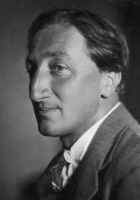The Ballad Of The 'Bluebell' Poem by A. P. Herbert
The Ballad Of The 'Bluebell'
(With respectful reference to the admirable exploit of Petty
Officer Alan Baker, of L .B .V. 37)
The Bluebell was a lighter, a dumb barge, a box,
For to lighten the ships in the stream and the docks;
But she weren't very big, and she weren't very new,
And she lay on the barge-roads with nothing to do.
Now, the lighters of London, they've names like a yacht,
Such as Blossom, and Zephyr, and Pilgrim, and Grot;
But their bottoms is flat, and, between you and me,
They was never intended to travel by sea.
But they took them old lighters, a thousand or more;
They cut out the ends and they put in a door;
They gave 'em a wheel, and a motor so fine,
And painted 'em camyflarge like a ship of the line.
Bill Fox was a lighterman, Bermondsey born,
A Freeman of the River, and twenty years sworn.
He could work a big lighter like a little canoe,
And all what's to know of the River he knew.
You should see him a-drive—or, as you would say,drift—
With a mighty great sweep that you can't hardly lift,
A-hitting the bridge-holes as nice as you please,
And making it look like a lifetime of ease.
All alone in his craft, with the wind right ahead,
A bit late on his tide, he'll drive on till he's dead.
For this is the oath all the lightermen swear:
'I'll never lay down till I get the craft, there.'
He knew every eddy from Vauxhall to Grays,
And the set of the tide, and the craft and their ways,
And the buoys and the lights from Barn Elms to the sea;
But he didn't know more of the compass than me.
Now one day they says; 'Come, you lightermen all;
We're going for to crack this here Hitler's West Wall:
But the Navy can't do without lightermen like you!'
And the lightermen of London they done what was due.
They come up from Tilbury, they come down from Kew,
From the Prospect of Whitby, and the Dog and Duck too,
From Gallions, from Bugsby's, from Bow Creek and all,
For to help the Royal Navy crack up the West Wall.
They made Bill a petty officer, with a peak to his hat;
They taught him some drill, and the compass, and that;
They gave him two stokers, two seamen, A.B.,
And there he is, captain of a Landing Barge (V).
Well, according to orders the Bluebell sets sail;
It's rough, and it's blowing a bit of a gale;
They lose the old convoy, the engine breaks down—
And there she lays rolling like a lord-about-town.
The stokers they struggle but can't get things clear;
When up comes a corvette and says: 'What's all this here?
You're out of the battle, but don't you despair,
For I'm bound for U.K. and I'll tow you back there.'
'Why, thank you,' says Bill, 'but that's no use to me;
For I've got to deliver these vehicles, you see;
I'm a lighterman of London, and I beg to declare
I never lay down till I've got the craft there.'
Then Bill to his crew he says: 'Boys, are you game
To take these here vehicles across just the same?'
'Aye, aye,' says the stokers, 'we've only one care,
Which is, how we proceeds—and, for that matter, where?'
Says Bill: 'They're so keen on 'Security' now,
They didn't say where we was bound, I allow;
But I fancy it's France, and, the wind being fair, .
Well, what I suggest, we proceeds over there.
'And as to the first point, we've got the two sweeps,
And we've got the tarpaulin what covers the jeeps:
I'd row the ship over if it weren't for the gale,
But we'll rig the tarpaulin and, see if she'll sail!'
Well, that's what they done. It weren't easy, of course;
For that old tarpaulin she pulls like a horse;
But they hit the right part of the coast, which was queer,
And Bill says the Americans stood him a beer.
They've left them old lighters on the Normandy shore;
We won't see the Bluebell at Limehouse no more:
But they're lightening the steamers, a job that they know,
And passing the mustard for Hitler and Co.
And Bill's back in civvies as right as the rain,
A-driving his craft through the bridge-holes again:
So let's take a pint, sir—no more than is due
To the lighters of London—and the lightermen too.
This poem has not been translated into any other language yet.
I would like to translate this poem